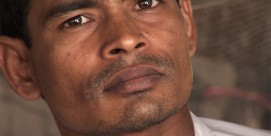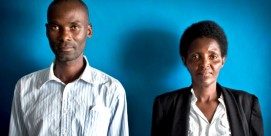Tag: Genocide
“You had people watching synagogues burn. You had people looting businesses that had been plundered. You had people joining in on the violence.” More
“There’s a fear among large segments of the Buddhist population in Myanmar,” says Matthew Smith, executive director of Fortify Rights, an independent organization to protect and defend human rights, “that the country is at risk of being taken over by Muslims. It’s a very unreasonable, irrational fear.” Originally broadcast April 18, 2014 More
(Photo: AP) “When I first saw him, I was so traumatized I had to be taken to the hospital for 10 days,” says Alice Mukarurinda, recalling her first encounter with Emmanuel Ndayisaba at a reconciliation group. He nearly killed her during the genocide. “I managed to forgive him. I believe it was God’s power.” More
“There’s a fear among large segments of the Buddhist population in Myanmar,” says Matthew Smith, executive director of Fortify Rights, an independent organization to protect and defend human rights, “that the country is at risk of being taken over by Muslims. It’s a very unreasonable, irrational fear.” More
“You had people watching synagogues burn. You had people looting business that had been plundered. You had people joining in on the violence.” More
“Let the souls of the millions who have died speak to us and speak through us,” said Rabbi Bruce Lustig of the large public art installation that raises awareness of ongoing genocides and mass atrocities. “We all share the same bones. No matter your creed, no matter your color, we are all created in the image of God.” More
Watch more of our conversation about Libya, humanitarian intervention, and the ethical questions being raised by NATO’s current military strategy.
MoreWatch excerpts from our recent interview with the author of “Shake Hands with the Devil: The Failure of Humanity in Rwanda” and “They Fight Like Soldiers, They Die Like Children: The Global Quest to Eradicate the Use of Child Soldiers.” More
“In that courtroom in Jerusalem 50 years ago, people heard the voices of those victims in a way that they hadn’t heard them before,” says Deborah Lipstadt, professor of modern Jewish history and Holocaust studies at Emory University and the author of “The Eichmann Trial.” More
A Yale Law School professor considers what force should be used for in a just world and says intervening militarily to protect people being slaughtered by their own government is “an enormous break with America’s practice.” More





